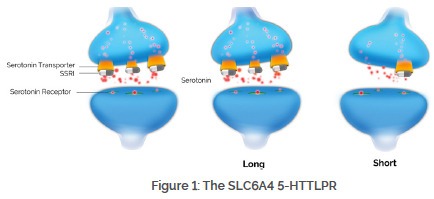Are Anxiety Disorders Genetic? A Comprehensive Exploration of Genetic Influences on Anxiety

Anxiety disorders are some of the most prevalent mental health issues worldwide, impacting millions of people. These disorders, characterized by excessive worry, fear, or nervousness, can significantly interfere with daily life. While the role of environmental factors such as stress, trauma, and upbringing in the development of anxiety disorders is well-known, an essential question remains: Are anxiety disorders genetic? Understanding whether genetic factors contribute to anxiety disorders can help provide insights into both prevention and treatment.
In this article, we will explore the question Are anxiety disorders genetic? through the lens of scientific research, investigating family studies, twin studies, and specific genetic links. Additionally, we will discuss the interplay between genes and the environment to understand whether anxiety disorders have a genetic basis.
Defining Anxiety Disorders

Before delving into the question, Are anxiety disorders genetic?, it is essential to understand what anxiety disorders entail. Anxiety disorders are a group of mental health conditions that include generalized anxiety disorder (GAD), social anxiety disorder (SAD), panic disorder, and specific phobias. Unlike regular feelings of anxiety, which can be normal in certain situations, anxiety disorders involve persistent and excessive fear or worry, often occurring without a clear trigger.
These disorders can be debilitating, leading to symptoms such as restlessness, fatigue, difficulty concentrating, and physical symptoms like sweating or palpitations. While environmental factors are undoubtedly involved in anxiety disorders, the role of genetics has become a focal point of research, raising the question Are anxiety disorders genetic?.
The Genetic Contribution to Mental Health

The idea that mental health conditions could have a genetic component is not new. Just as physical traits such as eye color or height can be passed down through families, so too can the risk for certain mental health conditions. Researchers have increasingly turned to genetics to answer the question Are anxiety disorders genetic?, hoping to uncover whether inherited traits contribute to the onset of anxiety disorders.
Several studies suggest that genes play a role in the development of anxiety disorders, with family and twin studies providing valuable insights. While environmental influences are critical, the genetic component cannot be overlooked.
Family Studies: The First Clue
One of the first steps scientists took to investigate Are anxiety disorders genetic? was through family studies. By observing the prevalence of anxiety disorders within families, researchers noticed that those with a close relative suffering from an anxiety disorder were more likely to develop one themselves. For instance, if a parent or sibling has an anxiety disorder, the likelihood of another family member developing a similar disorder is significantly higher compared to the general population.
These findings provided the initial evidence suggesting that the answer to Are anxiety disorders genetic? might be yes. Specifically, studies have shown that first-degree relatives of individuals with anxiety disorders are two to six times more likely to develop anxiety than those without a family history. This increased risk was found across a range of anxiety disorders, including generalized anxiety disorder, panic disorder, and social anxiety disorder.
Twin Studies: Isolating Genetics from Environment
While family studies hinted at a genetic link, they could not fully answer the question Are anxiety disorders genetic? because family members also share environmental factors. To isolate the role of genetics, scientists turned to twin studies. Identical twins share 100% of their genes, while fraternal twins share only about 50%. By comparing the prevalence of anxiety disorders in identical versus fraternal twins, researchers could better understand the genetic contribution.
The results from these studies provided a clearer answer to Are anxiety disorders genetic? Twin studies have shown that heritability estimates for anxiety disorders range from 30% to 50%, depending on the type of disorder. For instance, generalized anxiety disorder (GAD) has a heritability estimate of around 30% to 40%, while social anxiety disorder has a higher estimate, sometimes reaching 50%. These findings confirm that genetics play a substantial role in the development of anxiety disorders.
Specific Genes Associated with Anxiety

After family and twin studies suggested a genetic link, the next step in addressing the question Are anxiety disorders genetic? involved identifying specific genes associated with anxiety. Genetic research has identified several candidate genes that influence brain chemistry and stress responses, which are believed to play a role in anxiety disorders.
One of the most well-researched genes in this area is the serotonin transporter gene (SLC6A4). Serotonin is a neurotransmitter that helps regulate mood, and variations in the serotonin transporter gene can affect how efficiently serotonin is processed in the brain. People with certain variations of this gene have been shown to be more susceptible to anxiety disorders, particularly when exposed to stressful life events.
Another gene linked to anxiety disorders is the catechol-O-methyltransferase (COMT) gene, which influences the metabolism of dopamine, a neurotransmitter associated with mood regulation and reward processing. Variations in the COMT gene have been linked to higher susceptibility to anxiety, especially in situations involving stress or emotional upheaval.
These genetic links provide additional evidence supporting the answer to the question Are anxiety disorders genetic? Though no single gene has been definitively proven to cause anxiety disorders, it is increasingly clear that multiple genes likely work together to increase susceptibility to anxiety.
Gene-Environment Interaction: Nature and Nurture
While the question Are anxiety disorders genetic? yields evidence that genes do play a role, it is crucial to understand that genes do not act in isolation. Gene-environment interactions are key to understanding the full picture of anxiety disorders. Even if someone has a genetic predisposition to anxiety, environmental factors—such as life experiences, stress, or trauma—can trigger or exacerbate this predisposition.
Research has shown that individuals with genetic vulnerabilities to anxiety are more sensitive to environmental stressors. For example, someone with a family history of anxiety may only develop the disorder after experiencing significant life stressors, such as the death of a loved one, financial difficulties, or a major life change.
Thus, the answer to Are anxiety disorders genetic? is nuanced. While genes certainly play a role in making individuals more susceptible to anxiety, environmental factors can determine whether or not the disorder manifests. It is this complex interplay of nature and nurture that ultimately shapes mental health outcomes.
Epigenetics: How Life Experiences Influence Gene Expression
To further complicate the question Are anxiety disorders genetic?, researchers have explored the role of epigenetics. Epigenetics refers to changes in gene expression that do not alter the underlying DNA sequence but are influenced by environmental factors such as stress, diet, or trauma. These epigenetic changes can affect how genes related to anxiety are expressed and may even be passed down through generations.
For example, early-life trauma has been shown to cause epigenetic changes that affect the regulation of stress hormones, increasing the likelihood of developing anxiety disorders later in life. These changes can last long after the trauma has occurred, suggesting that while genes may set the stage for anxiety, life experiences can switch these genes on or off.
Epigenetics adds another layer to the question Are anxiety disorders genetic? by highlighting how environmental factors can modify genetic predispositions. It also emphasizes the importance of addressing both biological and environmental influences when studying anxiety disorders.
Inherited Vulnerability: The Genetic Predisposition
The idea of inherited vulnerability is central to answering the question Are anxiety disorders genetic? Genetic predisposition means that certain individuals are more likely to develop anxiety disorders due to inherited traits. These individuals may have a higher sensitivity to stress or difficulties in emotional regulation, which increases their susceptibility to anxiety.
This genetic predisposition, however, does not mean that someone will inevitably develop an anxiety disorder. It simply means that they are at higher risk, particularly if exposed to stressful or traumatic environments. Understanding this concept of inherited vulnerability can help clinicians identify individuals who are at higher risk for anxiety and provide early interventions.
Genetic Testing: Can It Predict Anxiety?

With growing evidence to support the question Are anxiety disorders genetic?, some might wonder whether genetic testing can predict an individual’s risk for anxiety disorders. Currently, genetic testing is not yet a reliable method for predicting anxiety. Anxiety disorders are influenced by multiple genes and environmental factors, making it difficult to use genetic information alone to predict whether someone will develop the disorder.
However, as research continues to advance, it is possible that genetic testing could eventually play a role in identifying individuals at higher risk for anxiety and guiding personalized treatment plans.
Conclusion: Are Anxiety Disorders Genetic?
So, Are anxiety disorders genetic? The evidence suggests that they are, to a significant extent. Family studies, twin studies, and research on specific genes all point to a genetic component in the development of anxiety disorders. Heritability estimates suggest that genetics account for 30% to 50% of the risk for anxiety disorders, depending on the type of disorder.
However, the answer to Are anxiety disorders genetic? is not straightforward. While genetics play an important role, environmental factors such as trauma, stress, and upbringing also significantly contribute to the development of anxiety disorders. The interplay between genes and the environment is what ultimately determines whether someone will experience an anxiety disorder.
In summary, while the answer to the question Are anxiety disorders genetic? is yes, it is crucial to understand that genetics is only one part of the puzzle. Environmental influences, gene-environment interactions, and epigenetic factors all contribute to the complexity of anxiety disorders. Understanding this intricate relationship will be key to developing more effective treatments and preventive strategies for those at risk.
